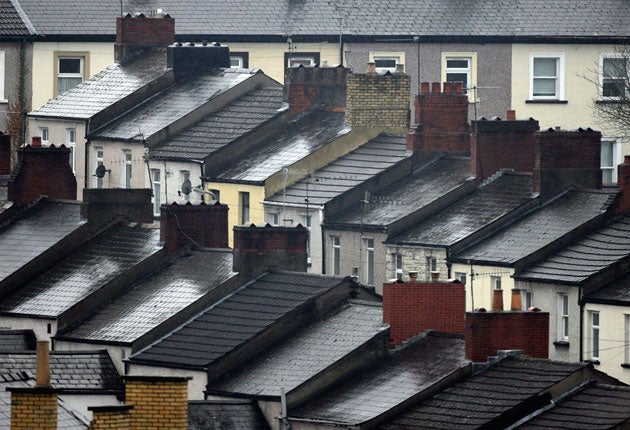Your support helps us to tell the story
From reproductive rights to climate change to Big Tech, The Independent is on the ground when the story is developing. Whether it's investigating the financials of Elon Musk's pro-Trump PAC or producing our latest documentary, 'The A Word', which shines a light on the American women fighting for reproductive rights, we know how important it is to parse out the facts from the messaging.
At such a critical moment in US history, we need reporters on the ground. Your donation allows us to keep sending journalists to speak to both sides of the story.
The Independent is trusted by Americans across the entire political spectrum. And unlike many other quality news outlets, we choose not to lock Americans out of our reporting and analysis with paywalls. We believe quality journalism should be available to everyone, paid for by those who can afford it.
Your support makes all the difference.House prices dropped by 1.1% in April as estate agents struggled to sell just one property a week, figures showed today.
The property market failed to benefit from its traditional spring bounce this year as the run of bank holiday weekends hit activity levels, while concerns about the economy and the ongoing problems in the mortgage market also affected demand.
The Royal Institution of Chartered Surveyors said estate agents sold an average of just 14.7 properties in the three months to the end of May, the equivalent of only one sale a week and the lowest level since the start of the year.
They also continued to report falling house prices, as potential buyers stayed away from the market, but more homes were put up for sale.
The fragile state of the property market was further highlighted by figures from Communities and Local Government, showing house prices dropped by 1.1% during April.
The latest slide left the average UK home costing £204,439, nearly £4,000 down on the start of the year and 0.3% less than 12 months earlier - the first time annual house price inflation has been negative since October 2009.
House prices were lower in nine of the UK's 12 regions than they were a year ago, with Northern Ireland continuing to register the steepest falls at 15.2%, followed by the North East at 4% and West Midlands at 3.8%.
The southern regions of London, the South East and the East are now the only areas where house prices are higher than they were 12 months earlier.
But even here growth is muted, with London posting a 3.6% rise, while prices are 1.1% and 0.8% higher in the South East and East respectively.
Meanwhile, the balance of chartered surveyors who reported seeing price falls in May rose to 28%, compared with 21% in April, the highest level since the beginning of the year and the first increase since October 2010.
At the same time, 2% more surveyors reported a fall in inquiries from potential buyers than those who saw a rise, with many blaming the bank holidays for the subdued demand.
But the number of people putting their homes up for sale continued to rise, with a balance of 15% of surveyors reporting an increase in instructions.
Chris Crowe, of Barclays Capital, said: "The May Rics survey showed the UK housing market going into reverse.
"The headwinds affecting the UK housing market, including declining household incomes, high indebtedness, less favourable credit conditions and concerns over public sector layoffs, may be starting to exert a real drag on prices and activity."
Howard Archer, chief UK and European economist at IHS Global Insight, said: "The CLG data showing an appreciable dip in house prices in April reinforces our long-held view that house prices will trend lower over the coming months.
"We suspect that house prices will end up declining by some 10% overall by mid-2012 from their 2010 highs."
Surveyors also remain gloomy about the market's prospects, with 27% more expecting prices to continue falling than those who think property values will recover.
But they are slightly more optimistic about sales levels, with a balance of 9% expecting the number of homes changing hands to increase in the coming months.
The latest figures on the housing market come as the Council of Mortgage Lenders said mortgage advances to people buying a home jumped by 8% in April but lending levels remained down on a year earlier.
At 40,900 loans, levels were also running at around half the level typically seen in April before the credit crunch struck, further highlighting the subdued state of activity in the property market.

Join our commenting forum
Join thought-provoking conversations, follow other Independent readers and see their replies
Comments